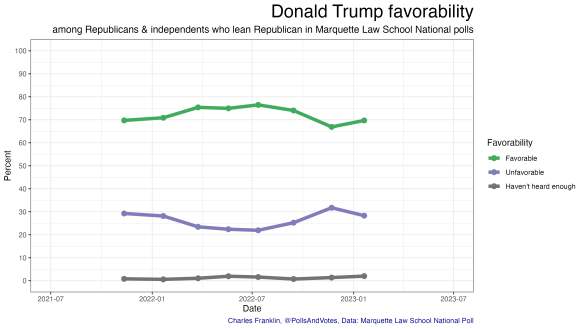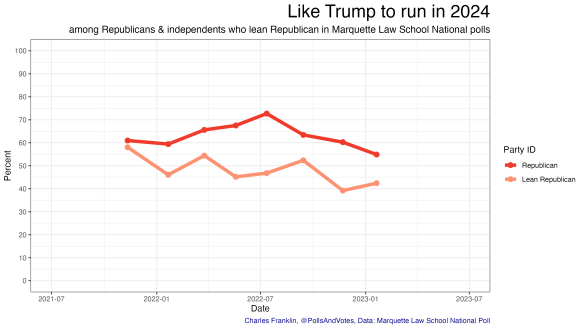It is “big decisions” week at the U.S. Supreme Court. While most people have an opinion about how the Court is handling its job, the details are often obscure to a substantial share of the public. This week’s decisions will come as surprises to many who don’t follow the Court’s docket.
The Court has suffered a substantial decline in approval since 2020, when fully 66% approved of the job the Court was doing. As of May, 2023, approval stands at 41%. All the data reported here is from the Marquette Law School Poll national surveys of adults.

Approval of the Court differs sharply by party identification, with Republicans maintaining a high approval rating around 60% but independents dropping into the 30s and Democrats into the 20s.

There has been considerable stability in views of the Dobbs decision, which struck down Roe v Wade in June 2022, at least among those who have an opinion on the case (more on those without an opinion below.) About 2/3rds oppose overturning Roe, while 1/3rd support the Dobbs decision.

Approval has changed in “sensible” directions, following party and shifting as the Court has issued major decisions. Disagreement with outcomes drives approval down, agreement with outcomes increases approval. Few of the public are aware of the details of legal reasoning in decision, though elite discourse may emphasize textualism or originalism or “history, text, and tradition” based arguments.
The limits of public attention to the Court is vividly illustrated by awareness of the balance of justices nominated by Republican and by Democratic presidents. Nominations have been intensely contested for over a decade (arguably longer) and the three Trump appointments followed in the wake of Obama’s nominee being denied hearings or a vote in 2016 following Justice Scalia’s death. If a lot of politics has been “all about the judges”, much of the public hasn’t followed the story.
Despite a long standing Republican-appointed majority on the Court, and the current 6-3 majority, 30% of the public believes a majority of the justices were appointed by Democratic presidents. About 40% say a majority was “probably” appointed by Republican presidents, and just 30% say a majority was “definitely” appointed by Republican presidents.

In the wake of the Dobbs decision there was a 10 point rise in the percent saying “definitely” Republican appointed majority, and a drop of 10 points in the percent incorrectly believing Democrats had appointed a majority. But this increased information has declined over the year since Dobbs, giving up all those gains to return to where it was, with 30% saying definitely Republican majority and 30% thinking Democratic appointees are the majority.
For those following, or reporting on, the Court, the share of the public unaware of the makeup of the majority is striking. Discussion of the Court generally assumes some facts are universally known, but this is not the case.
The Dobbs decision has shifted the policy landscape after 50 years of settled law, and has made abortion a central issue in many campaigns as state legislatures have adopted sharply differing laws, replacing the basic national standards for abortion rights under Roe and Casey that had prevailed.
The Dobbs case was clearly on the horizon for months before it was decided. Yet when we (the Marquette Law School Poll) asked about it in Sept. 2021, 30% said they “haven’t heard enough to have an opinion.”
Pre-decision
Do you favor or oppose the following possible future Supreme Court decisions, or haven’t you heard enough about this to have an opinion?
Overturn Roe versus Wade, thus strike down the 1973 decision that made abortion legal in all 50 states.
Post-decision
Do you favor or oppose the following recent Supreme Court decisions, or haven’t you heard enough about this to have an opinion?
Overturned Roe versus Wade, thus striking down the 1973 decision that made abortion legal in all 50 states.

The leak of the Dobbs opinion raised awareness about 8 points while the actual decision increased awareness another 10 points. By the fall of 2022, about 10% said they hadn’t heard of the Dobbs decision. This is an example of how an extraordinarily salient decision can reach almost all of the public, certainly more than the typical case or of the Court majority above.
This week, we expect a decision on the use of race as a factor in college admissions. This issue has been with us at least since the Bakke case in 1978, and has been revisited since, notably in Grutter v. Bollinger (2003).
As of May, just over half of our national sample say they haven’t heard about the case or not enough to have an opinion.

Do you favor or oppose the following possible future Supreme Court decisions, or haven’t you heard enough about this to have an opinion?
Rule that colleges cannot use race as one of several factors in deciding which applicants to admit.
Whatever decision the Court reaches, it will come as something of a surprise to half the public. When we poll in July, it will be interesting to see how many remain unaware of this decision. Will that fall sharply, as in Dobbs, or will a substantial minority remain unaware of the decision?
A similar lack of familiarity is clear in another much talked about case (among Court watchers), 303 Creative, which concerns a business owner’s right, based on 1st Amendment speech or religious liberty grounds, to deny services to LGBTQ customers. Here too, about 45% lack awareness of the pending decision.

While a plurality favor banning the use of race in admissions, a plurality oppose allowing businesses to deny services. But in both cases the largest group is those not familiar with the case.
Views of the justices
Despite recent coverage of the justices, most of the public says they either haven’t heard of each justice, or haven’t heard enough to have a favorable or unfavorable opinion. Here we encourage respondents to say if they lack an opinion. Our question reads:
Some justices of the Supreme Court are better known than others. For each of these names have you never heard of them, heard of them but don’t know enough to have an opinion of them, have a favorable opinion or have an unfavorable opinion?
In other surveys (including ours for different questions) “haven’t heard enough” or “don’t know” may not be an explicit option. Many respondents will offer an opinion in this case. Those responses may also contain valuable information, encouraging reluctant respondents to still venture an opinion. In light of our finding on awareness of the majority on the Court, and on specific cases, we choose to frame the question in a way that explicitly acknowledges the possibility that not every justice is well known.
As the chart makes clear, many people lack opinions of each justice. There is variation, with some better known than others, but the share of “haven’t heard enough” is higher than either favorable or unfavorable for all, if only slightly so for Justice Thomas.

More than 60% say they don’t have an opinion of Justice Alito. In November 2022 we asked respondents for their best guess as to which justice authored the Dobbs decision. A quarter correctly picked Alito, with another quarter picking Thomas, and a scattering among the other justices. This is a very difficult question for the general public, who do not as a rule rush to read opinions by their favorite justices. Perhaps it is impressive that as many as 1/4 got Alito right, and Thomas is not a bad guess, given his concurrence. Still, the point is most people don’t have specific information about individual justices even in the most visible decisions.

The May 2023 survey was conducted after a series of news stories concerning Justice Thomas’ financial disclosure statements, which did not report a real estate sale or certain travel expenses paid by others. Thirty-three percent said they had heard a lot about this, while 32% had heard a little and 35% had heard nothing at all. This was a prominent story in “Washington circles” but while 1/3rd heard a lot about it, just over 1/3rd heard nothing at all.
There is a substantial difference in awareness of the Court among those who generally pay attention to politics, which is nicely illustrated by awareness of the stories about Justice Thomas’s disclosure statements. About 36% in the May survey said they paid attention to politics “most of the time” while 64% pay attention less frequently.
News stories about Supreme Court Justice Clarence Thomas’ financial disclosure reports. (Here are some recent topics in the news. How much have you heard or read about each of these?) By attention to politics.
| Attention to politics | Heard a lot | A little | Nothing at all |
| Most of the time | 60 | 28 | 12 |
| Less often | 18 | 34 | 48 |
In the most attentive 1/3rd of the public, awareness of the stories about Thomas’ disclosures were quite well known, but this dropped precipitously once we move beyond those most attentive to politics generally.
The lesson is an old one. Most people don’t pay as much attention to either politics or the Court as you, dear reader, or I. This means public reaction to Court decisions may not follow what elite expectations may be, simply because much of the public wasn’t expecting the cases to be decided. Even in Dobbs, a substantial 30% didn’t see the case coming as late as March 2022.
Further, given how much partisanship affects perceptions of the Court, the 25-30% who believe there is a majority appointed by Democratic presidents will have curiously distorted opinions of the court. In May, among Republicans who eroneously believed a majority of the Court were appointed by Democratic presidents, 57% disapproved of the Court. Among Democrats with the same misperception, 60% approved of the Court. Compare that with Republicans correctly saying there is definitely a Republican appointed majority: 76% approve, while among Democrats also saying there is definitely a Republican appointed majority: 14% approve.
There is a reporting and messaging lesson here. A substantial share of the audience you are trying to reach is likely unaware of some facts you take for granted. It is important to expand awareness of those facts by making them part of your story, even if they seem “obvious.”



















































































